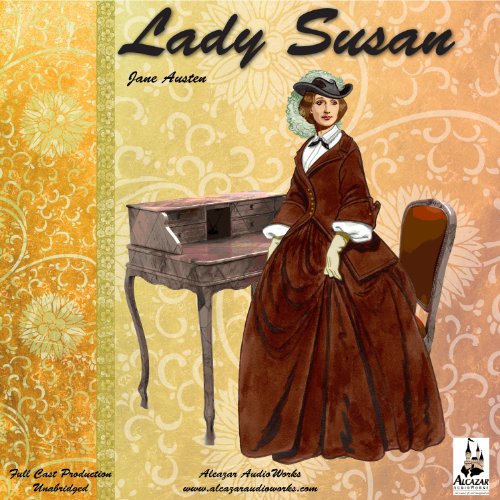-
Lady Susan
Jane Austen, Anne Flosnik, Alpha DVD
Audiobook (Alpha DVD, Oct. 8, 2009)Beautiful, flirtatious, and recently widowed, Lady Susan Vernon seeks an advantageous second marriage for herself, while attempting to push her daughter into a dismal match. This is a magnificently crafted novel of Regency manners and mores that will delight Austen enthusiasts with its wit and elegant expression.
-
Lady Susan
Jane Austen, Susan McCarthy, Laurellee Westaway, Melissa Leventon, David Thorn, Bobbie Frohman, Alcazar AudioWorks
Audiobook (Alcazar AudioWorks, Sept. 13, 2013)Written in the then fashionable style form of letters between the characters in the book, Jane Austen tells the story of the beautiful widow Lady Susan. Lady Susan has an eye toward re-marrying well, and marrying off her teenage daughter. To achieve her objectives, she spins a tale of Victorian humor and manipulation. In the end, she outsmarts even herself. Jane Austen's earliest known serious work, Lady Susan is a short, epistolary novel that portrays a woman bent on the exercise of her own powerful mind and personality to the point of social self-destruction. Lady Susan, a clever and ruthless widow, determines that her daughter is going to marry a man whom both detest. She sets her own sights on her sister-in-law's brother, all the while keeping an old affair simmering on the back burner. But people refuse to play the roles assigned them. In the end, her daughter gets the sister-in-law's brother, the old affair runs out of steam, and all that is left for Lady Susan is the man intended for her daughter, whom neither can abide. Told through a series of letters between the characters, the work concludes abruptly with the comment: "this correspondence…could not, to the great detriment of the Post Office revenue, be continued any longer." Jane Austen (1775–1817) was born in Steventon, England, and later moved to Bath. She began to write early for her own and her family's amusement. Her novels, set in her own English countryside, depict the daily lives of provincial middle-class families with wry observation, a delicate irony, and a good-humored wit. She is now considered by many scholars to be the first great woman novelist.
-
Lady Susan
Jane Austen
Hardcover (Kessinger Publishing, LLC, May 23, 2010)This scarce antiquarian book is a facsimile reprint of the original. Due to its age, it may contain imperfections such as marks, notations, marginalia and flawed pages. Because we believe this work is culturally important, we have made it available as part of our commitment for protecting, preserving, and promoting the world's literature in affordable, high quality, modern editions that are true to the original work. Z
Z
-
A Memoir of Jane Austen
James Edward Austen-Leigh
Audio CD (Recorded Books, Inc, Nov. 1, 2015)From the nephew of beloved author Jane Austen comes a biography of J. E. Austen-Leigh's "dear Aunt Jane." A family project that includes insights from those who knew Austen best, this memoir introduced the general public to the great novelist's works and delivers a cornucopia of delights for Austenphiles today. Published over fifty years after Austen's death, these family memories present Jane Austen in full, deepening listeners' relationship with and appreciation of the classic author.
-
Lady Susan
Jane Austen, Helena Mitchell, Bookstream Audiobooks
Audiobook (Bookstream Audiobooks, Nov. 18, 2019)Lady Susan is a short epistolary novel by Jane Austen, possibly written in 1794 but not published until 1871. This early complete work, which the author never submitted for publication, describes the schemes of the title character. Lady Susan Vernon, a beautiful and charming recent widow, visits her brother- and sister-in-law, Charles and Catherine Vernon, with little advance notice at Churchill, their country residence. Catherine is far from pleased, as Lady Susan had tried to prevent her marriage to Charles and her unwanted guest has been described to her as "the most accomplished coquette in England". Among Lady Susan's conquests is the married Mr. Manwaring.
-
Lady Susan
Jane Austen
(, June 27, 2017)Lady Susan by Jane Austen
-
Lady Susan
Jane Austen
Paperback (Independently published, Sept. 25, 2017)Austen's "most wicked tale," Lady Susan is a short epistolary novel by Jane Austen. Beautiful, flirtatious, and recently widowed, Lady Susan Vernon seeks an advantageous second marriage for herself, while attempting to push her daughter into a dismal match. A magnificently crafted novel of Regency manners and mores that will delight Austen enthusiasts with its wit and elegant expression. Z
Z
-
Lady Susan Illustrated
Jane Austen
Paperback (Independently published, Aug. 31, 2019)Lady Susan is a short epistolary novel by Jane Austen, possibly written in 1794 but not published until 1871. This early complete work, which the author never submitted for publication, describes the schemes of the title character. Z
Z
-
Lady Susan
Jane Austen
(, Oct. 8, 2017)Lady Susan by Jane Austen
-
Lady Susan
Jane Austen, Eva Mattes, Argon Verlag
Die attraktive Lady Susan sorgt für Aufregung in der Gesellschaft: Frisch verwitwet, kokettiert sie bereits wieder mit ihren Verehrern. Um den Gerüchten über angebliche Affären zu entgehen, zieht sie sich auf das Anwesen ihres Schwagers zurück. Dort kann sie ihren Plan in Ruhe weiterverfolgen: einen neuen wohlhabenden Ehemann zu finden. Objekt ihrer Begierde ist der adrette Reginald DeCourcy, der jüngere Bruder ihrer Schwägerin. Doch als eines Tages ihre Tochter Frederica auftaucht, geraten Lady Susans Pläne in Gefahr.
-
Lady Susan
Jane Austen
eBook (, June 14, 2017)Lady Susan by Jane Austen
-
Lady Susan
Jane Austen
(, Oct. 8, 2017)Lady Susan by Jane Austen